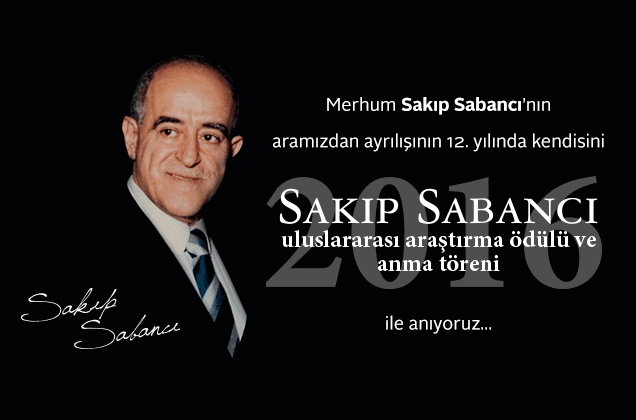07/04/2016
The 11th Sakıp Sabancı International Research Awards, endowed by Sabancı University in memory of Honorary Chairman Sakıp Sabancı, will be given at a ceremony to be held at the Sabancı Center on Monday, April 11, 2016.

The Sakıp Sabancı International Research Awards Ceremony to be held as part of the Sakıp Sabancı Remembrance Ceremony will be hosted by Sabancı University Founding Board of Trustees Chair Güler Sabancı and Sabancı University President Professor A. Nihat Berker as well as the Sabancı Family.
Covering fields such as Turkish and Islamic art and history, economics and sociology in Turkey, the Awards will be given to papers on “New Centers in Turkey: Economy, Education, Arts and Peace in Cities” this year.
Introductory remarks will be delivered by Sabancı University Founding Board of Trustees Chair Güler Sabancı, and also speaking will be Sabancı University Faculty of Arts and Social Sciences member Ayşe Parla on behalf of the jury panel consisting of internationally recognized Turkish and foreign professors.
Two researchers under 45 years of age will receive awards in the article category of the Sakıp Sabancı International Research Awards. The fifth Jury Prize will also be handed. Almost 350 submissions were received from 31 countries for the 11th Awards. Winners of the Article Awards and Jury Prize were selected by an international panel of independent jurists.
Subject of the 2016 Awards:
Cities have always been associated with human liberation. In Europe in the Middle Ages, the belief was that "the city environment liberated people." Modern cities too are defined as areas of high freedom potential for people leaving behind extended family ties and hierarchical agrarian relationships. However, attractive as the potential for human freedom may be, cities are also spheres where economic inequalities, income disparities, cultural differences and ghettoization trends become most visible.
Turkey is a country that is going through rapid urbanization. The percentage of urban population rose from 25% in the 1950s to 75% today. We are now living in an urbanized Turkey with all its risks and potential, and anatolian provinces prove to be the most dynamic ones in terms of rapid urbanization. Change and transformation since the 1980s gave rise to the emergence of new city centers in Anatolia. Provinces like Kayseri, Konya, Gaziantep, Eskisehir, Denizli, Çorum and others have become new nodes of economic and political power over the last three decades.
It is possible to argue that these new city centers challenge historical Republican cities of Istanbul, Ankara and Izmir as alternatives. These cities draw attention not only by their recent entrepreneurial ventures, but also their wealth of initiatives in education and artistic activities. What is new about the emergence of these cities? What are the drivers of entrepreneurship observed in these cities? How compatible are these new urban areas with the fundamental freedoms of citizens? Is the atmosphere (social and political environment) in these cities conducive to liberation - the historical function of cities? How can new urban spaces contribute to development, democratization and peace in Turkey?
This topic was chosen for this year's Sakıp Sabancı Research Awards in line with the interdisciplinary nature of Sabancı University. Submissions that made general and specific contributions to this subject from a wide and interdisciplinary academic perspective were assessed.





